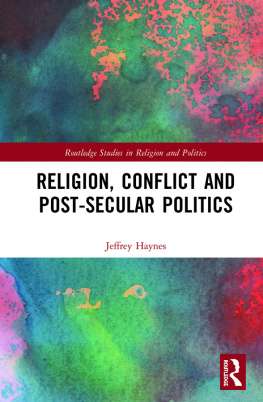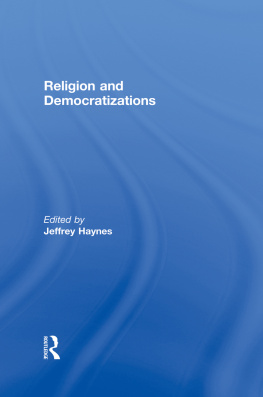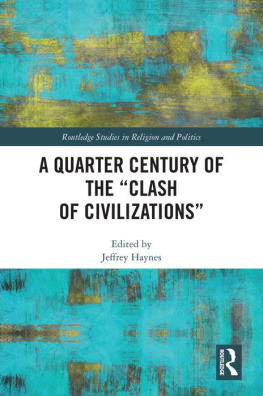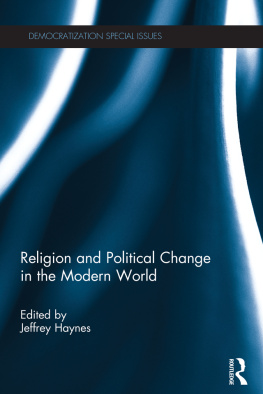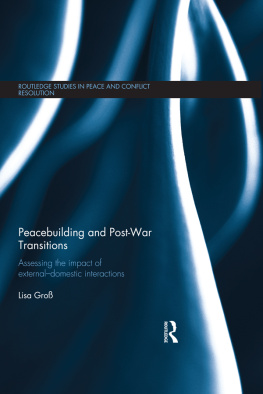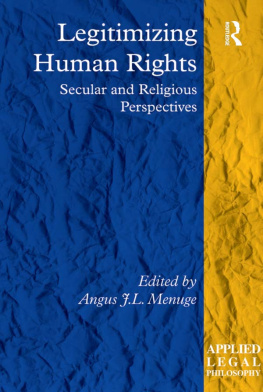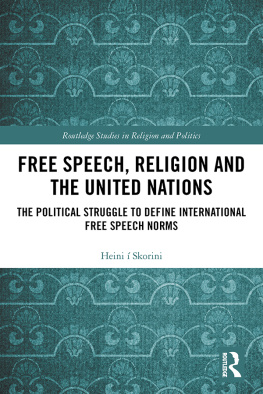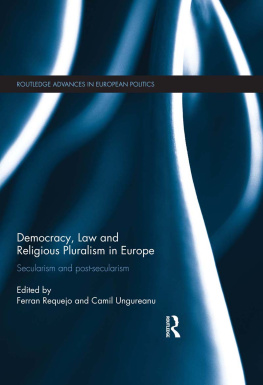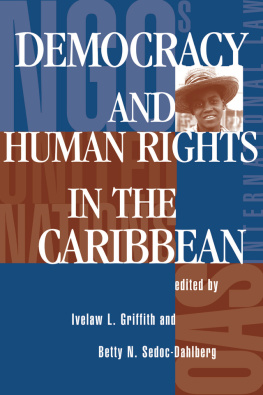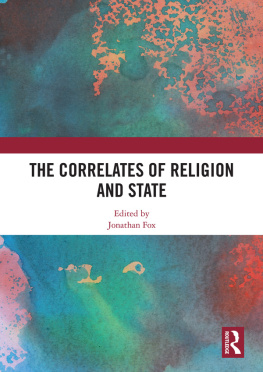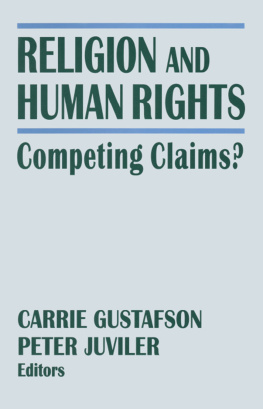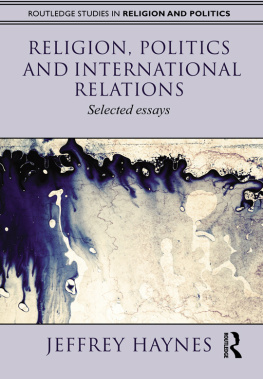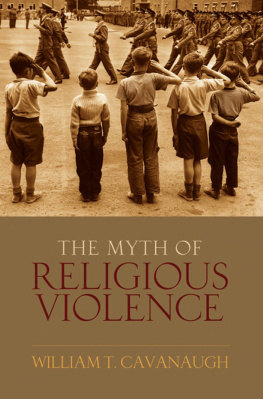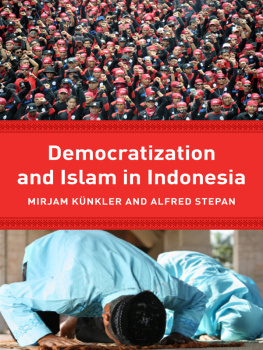Religion, Conflict and Post-Secular Politics
This book identifies and examines the political activities of selected religious actors, in both domestic and international contexts, in relation to democracy, human rights and civilisational interactions. And it asks why, how and when do selected religious actors seek to influence political outcomes?
The book is divided into two parts. examines the relationships between religion, human rights and civilisational interactions in the context of post-secular politics and links to conflict, and it explores how these relationships affect political outcomes in both domestic and international contexts.
This book will be of great interest to postgraduate and advanced undergraduate students of religion and politics; religion and international relations; democratisation and democracy; and global governance, especially studies of the United Nations. It will also interest practitioners and scholars who work on religion and politics, at the domestic and international levels.
Jeffrey Haynes is Emeritus Professor of politics at London Metropolitan University, UK. He is the editor of the series Routledge Studies in Religion and Politics and coeditor of the journal Democratization. His latest book is From Huntington to Trump: Thirty Years of the Clash of Civilizations (2019).
Routledge Studies in Religion and Politics
Edited by Jeffrey Haynes
London Metropolitan University, UK
This series aims to publish high quality works on the topic of the resurgence of political forms of religion in both national and international contexts. This trend has been especially noticeable in the post-Cold War era (that is, since the late 1980s). It has affected all the world religions (including, Buddhism, Christianity, Hinduism, Islam, and Judaism) in various parts of the world (such as, the Americas, Europe, the Middle East and North Africa, South and Southeast Asia, and sub-Saharan Africa).
The series welcomes books that use a variety of approaches to the subject, drawing on scholarship from political science, international relations, security studies, and contemporary history. Books in the series explore these religions, regions and topics both within and beyond the conventional domain of churchstate relations to include the impact of religion on politics, conflict and development, including the late Samuel Huntingtons controversial yet influential thesis about clashing civilisations.
In sum, the overall purpose of the book series is to provide a comprehensive survey of what is currently happening in relation to the interaction of religion and politics, both domestically and internationally, in relation to a variety of issues.
Religion in the Era of Postsecularism
Edited by Uchenna Okeja
War and Religion in the Secular Age
Faith and Interstate Armed Conflict Onset
Davis Brown
Faith Based Organisations in Development Discourses and Practice
Edited by Andreas Heuser and Jens Khrsen
Religion, Conflict and Post-Secular Politics
Jeffrey Haynes
For more information about this series, please visit: www.routledge.com/Routledge-Studies-in-Religion-and-Politics/book-series/RSRP
Religion, Conflict and Post-Secular Politics
Jeffrey Haynes
First published 2020
by Routledge
2 Park Square, Milton Park, Abingdon, Oxon OX14 4RN
and by Routledge
52 Vanderbilt Avenue, New York, NY 10017
Routledge is an imprint of the Taylor & Francis Group, an informa business
2020 Jeffrey Haynes
The right of Jeffrey Haynes to be identified as author of this work has been asserted by him in accordance with sections 77 and 78 of the Copyright, Designs and Patents Act 1988.
All rights reserved. No part of this book may be reprinted or reproduced or utilised in any form or by any electronic, mechanical, or other means, now known or hereafter invented, including photocopying and recording, or in any information storage or retrieval system, without permission in writing from the publishers.
Trademark notice: Product or corporate names may be trademarks or registered trademarks, and are used only for identification and explanation without intent to infringe.
British Library Cataloguing-in-Publication Data
A catalogue record for this book is available from the British Library
Library of Congress Cataloging-in-Publication Data
Names: Haynes, Jeffrey, 1953 author.
Title: Religion, conflict and post-secular politics / Jeffrey Haynes.
Description: Abingdon, Oxon ; New York, NY : Routledge, 2020. | Series: Routledge studies in religion and politics | Includes bibliographical references and index. |
Identifiers: LCCN 2019046451 | ISBN 9780367425791 (hardcover) | ISBN 9780367853655 (ebook)
Subjects: LCSH: Religion and politics. | Religion and international relations. | DemocratizationReligious aspects. | DemocracyReligious aspects. | Human rightsReligious aspects. | Secularism. | Postsecularism.
Classification: LCC BL65.P7 H369 2020 | DDC 201/.72dc23
LC record available at https://lccn.loc.gov/2019046451
ISBN: 978-0-367-42579-1 (hbk)
ISBN: 978-0-367-85365-5 (ebk)
Typeset in Times New Roman
by Apex CoVantage, LLC
Contents
SECTION 1
Religion and democratisation: What do we now know?
SECTION 2
Religion, human rights and civilisational interactions: Post-secular politics and conflict
Guide
Around the world, numerous religious actors1 affect political outcomes in various ways. Why, how and when do religious actors act politically both within and between countries? The key question on which the book focuses is, Why, how and when do selected religious actors seek to influence political outcomes in both domestic and international contexts?
In recent years, scholars have identified a range of religious actors with a variety of political goals. The aim of this book is to identify, examine and analyse the political activities of a selection of religious actors. Collectively, the chapters of this book focus on the relationship of religion to democratisation and democracy; human rights; and civilisational interactions. The aim of this introductory chapter is to locate those which follow in the wider issues that characterise recent scholarly focus in relation to religion, politics and international relations. A focus on the relationships between religion and politics is around four decades old: Since the Iranian Revolution in 1979 and the contemporaneous rise of the religious right in the US, political scientists and international relations scholars have noted the increasing political involvement of various religious actors. They include sundry Islamist groups and the Roman Catholic Church, which have had variable political impacts both domestically and internationally.
, is titled Religion, democratization and secularization. When first published in 2009, it was the concluding article of a special issue of the journal Democratization, titled Religion and democratizations.
The relationship between religion and politics has been controversial for decades. After World War II, scholars stressed the importance of political culture in encouraging democratisation in West Germany, Italy and Japan (Linz and Stepan, 1996; Stepan, 2000; Huntington, 1991). Certain religious traditions including Roman Catholicism in Italy and Christian democracy in West Germany were said to be important in the (re)making of these countries political cultures after the traumatic experience of totalitarian political regimes (Casanova, 1994). Later, during the third wave of democracy (mid 1970s late 1990s), much attention was paid to the role of religious actors, both Christian and Muslim, in democratisation in various parts of the world, including Europe, the Middle East, North Africa and sub-Saharan Africa (Huntington, 1991; Haynes, 2005). Some countries saw the undermining and eventual replacement of unelected governments by peoples power. This occurred in, inter alia, Eastern Europe, Africa and parts of Asia. There was also the contemporaneous rise of the religious right in the United States and its considerable impact on the electoral fortunes of both the Republican Party and the Democratic Party. From the late 1980s, the widespread growth of Islamist movements across much of the Muslim world, including the Middle East, North Africa and East Africa, had significant ramifications on electoral outcomes in many regional countries. The collective aim of the chapters in this section is to examine these issues.

